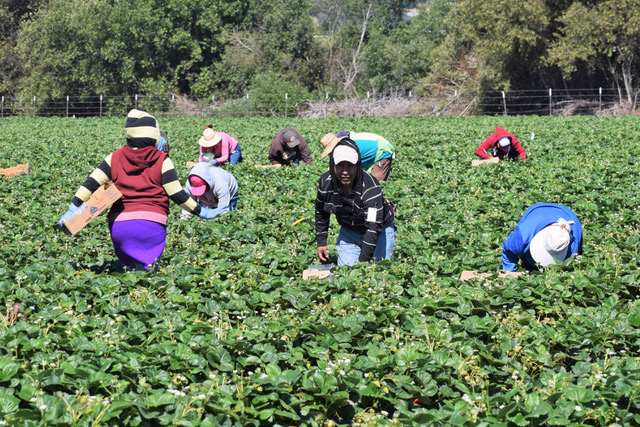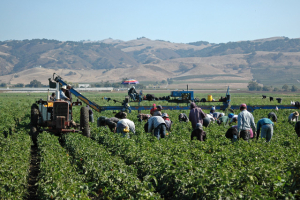
Here Is What We Must Do Now
June 17, 2025 Roots of Changeby Michael R. Dimock
When the pandemic hit, President Trump and Congress designated food chain workers from field to table as “essential workers” because despite legal status they ensure people eat. Thus, the ICE raids on farms, factories and restaurants are unjustifiable. The June 1 San Diego raids and community reaction, followed five days later in Los Angeles, sparked a question in me: what can I do to ensure our food chain workers are afforded due process and not lost to the American food system? But there was welcome news. The agriculture industry moved President Trump to announce a halt to the raids on farms, restaurants, and processing plants last week. Then I really felt a surge of hope when over five million Americans in 2100 communities came out to protect the rule of law on June 14th. But on June 16th, the President reversed course and called for raids again on food chain workers. Answers to my question have come clear: refuse denial, face the discomfort, and show up in several ways.
ROC’s staff remind me that demonstrations maintain focus on the objection to the policies; inspire others to join in; and tell the world that millions of Americans disagree with the Administration. But I remain skeptical about the power of demonstrations alone to effect change. So far demonstrations seem to incite more oppression.
We must do more. We can send money to legal warriors like the ACLU or Earth Justice that battle in the courts. Although the Administration may not comply with rulings. We can refuse to downplay the seriousness of the moment and consciously witness what is being done. The resulting anger will help us overcome fear and to stand for our nation’s greatest rights: freedom of speech, freedom of assembly, and the vote, and our greatest principle: the rule of law.
Violence is counterproductive. The Administration recently used it to erode the power of democratically elected state and local officials. The rise of the Nazis in Germany provides a lesson. In the 1920s and 30s, there was resistance from socialist, communist, and democratic parties. Violence was rampant with killings on all sides, but the Nazi Brownshirts prevailed. The weekend assassinations in Minnesota threaten a similar future. This split could fester into a kind of civil war as portrayed in that chilling 2024 feature film titled Civil War. And history reveals that violence only begets more violence.
The Civil Rights, Anti-War, and ACT UP movements succeeded, but they required time to work. It took 100 years of lynching, murder and terrorization of Black folk and then dogs and truncheons used on courageous and dignified nonviolent demonstrators crossing the Edmund Pettus Bridge in 1965 for the President and Congress to decisively act. The anti-war movement only began to succeed when soldiers at the front began fragging their officers and returning combat veterans led street demonstrations and shared their stories. Then National Guard troops killed four and wounded nine students at Kent State, but still the war continued. Finally the photo and film of a naked little girl burned by napalm created overwhelming opposition that ended the war. But it was six years of agony for the Vietnamese and Americans. It took ACT UP three years to force FDA to accelerate the drug approval process and six years to convince the CDC to include symptoms specific to women in its definition of AIDS. I am not sure we have six years or even three to sustain our food chain workers and save democracy.
A key ingredient that ties these movement victories together is fear of survival. If I fear that I or someone I love will be lynched, shot, or die of disease, I am more likely to risk facing National Guard troops or riot police. That gets me back to Germany in the 1930s. After the Brownshirts eliminated the leadership of the opposing political parties, the Nazis focused on small minorities: gay people, gypsies and Jews as the enemy to be blamed for the nation’s woes. The largest proportion of Germans did not feel threatened and the captains of industry felt Hitler would make them richer. A majority went along and state violence cowed the few who rejected the Nazi ideology. Resistance sufficient to stop Hitler and his henchmen never materialized from within.
I worry whether we can manifest sufficient resistance. Few politicians are of help. The social media posts and torrent of emails from most show that they think money is the key. I am done with their approach to partisan politics. Typically, the most powerful corporate leaders are more worried about stock prices than the rule of law and immigrant rights. Entrenched interests at the top do not lead, they protect their interests. They are all wrong because courage is the key.
And there are positive indicators. Farmers have been locking gates to keep ICE out since January. After Americans on the street began to resist ICE, agricultural leaders leaned harder into the Administration to denounce the raids. I applaud them! Until June 14th, I thought too few Americans felt threatened. But clearly average Americans are saying no to ICE, no to autocracy. Thus, I am encouraged. And it is still early.
I want you to feel as disturbed, uncomfortable, and angry as I do. I want you to stand against the war on food chain workers and the rule of law. When you, me and our neighbors do not back down in opposing these economically, socially, and morally harmful policies, enough politicians and corporations will follow. It will take time and real perseverance, but it is up to us now.
farmworkers, ICE raids, protest, undocumented farmworkers, undocumented immigrants


